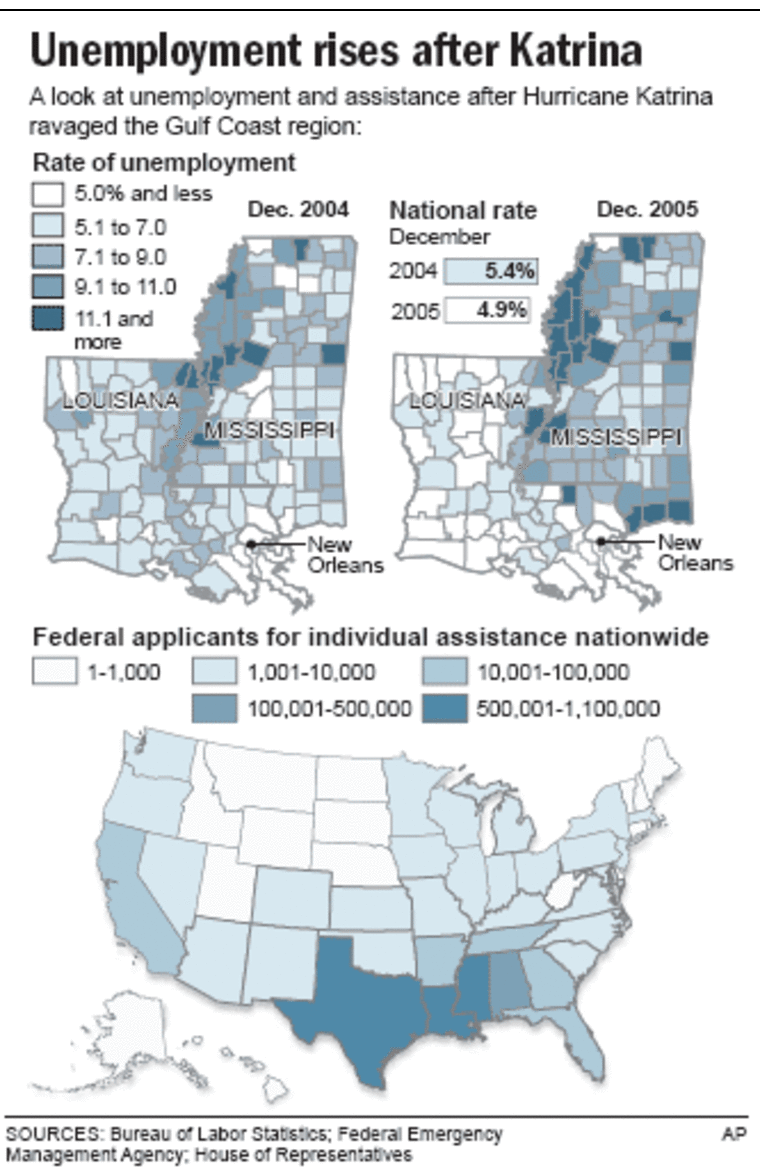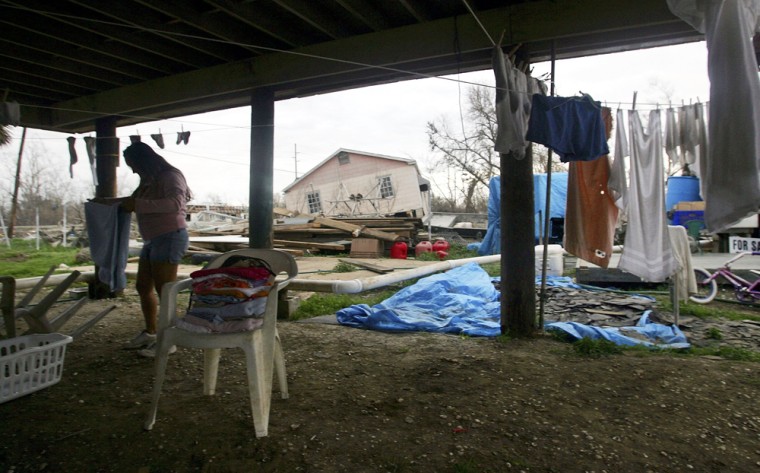Six months after Hurricane Katrina laid waste to the Gulf Coast, charities have disbursed more than $2 billion of the record sums they raised for the storm's victims, leaving less than $1 billion for the monumental task of helping hundreds of thousands of storm victims rebuild their lives, according to a survey by The Washington Post.
Two-thirds of the $3.27 billion raised by private nonprofit organizations and tracked by The Post went to help evacuees and other Katrina victims with immediate needs -- cash, food and temporary shelter, medical care, tarps for damaged homes and school supplies for displaced children.
What's left, say charities and federal officials, will need to be stretched over years to rebuild lives and reconstruct the social fabric of the Gulf Coast -- from job training to mental health counseling to rebuilding the homes of the poor to reestablishing arts organizations and paying clergy as they wait for their congregations to return.
The Post survey, the first detailed examination of the largest outpouring of charity in the nation's history, also found the following:
- The Red Cross, which was criticized for slow distribution of donations after the Sept. 11, 2001, terrorist attacks, has given out 84 percent of its Katrina and Rita donations.
- 50 cents of each donated dollar went out in cash to victims.
- 6 percent of contributions came in the form of supplies -- building materials, food, water, clothing, heavy equipment -- contributed mostly by corporations.
- 56 percent of remaining donations are controlled by faith-based organizations. They include such well-known institutions as Catholic Charities USA and the Salvation Army but also such lower-profile groups as the United Methodist Committee on Relief and United Jewish Communities.
What remains to be done goes well beyond even the staggering costs of rebuilding infrastructure -- projects estimated to require nearly $200 billion in government aid over the long term.
"There are many, many needs that the federal government cannot cover," said Don Powell, a former Federal Deposit Insurance Corp. chairman who was named coordinator of the Gulf's long-term recovery by President Bush in November. Many are "the crucial part of life that we all depend on," he said. "It's not public works. It's not water, sewage or utilities. It's the soul of our life."
No one has put a price tag on restoring the "soul" of a region after such devastation, but the current charitable resources of about $960 million, as calculated by The Post, will not be sufficient, Powell said.
The line between what the government pays for and what charities will cover is blurred. Even though many Gulf Coast residents are eligible for federal assistance for some housing costs, plenty of other residents will not qualify, say charities, who predict they'll have to pick up the slack. Also, the law that governs federal spending after a disaster strictly limits how much can go to private entities -- places of worships and arts groups, mental health services, youth programs and child-care centers. The desolate fiscal situations in Mississippi and Louisiana leave those states in no position to cover what the feds cannot. Charity officials say their organizations will try to step into that breach.
For weeks after the storm, Americans and their employers poured hundreds of millions of dollars into charities, churches, synagogues and other religious organizations. Thousands of truckloads of supplies were sent to the Gulf Coast.
Broader challenges
The speed of the charitable inflow after Katrina topped the torrid pace of donations after the Sept. 11 attacks, when donations hit the $1 billion mark in six weeks and ultimately rose to $2.8 billion, according to Indiana University's Center on Philanthropy.
Donations to Katrina, in contrast, hit $1 billion in three weeks.
Even so, Katrina presents far broader challenges -- simply because the money must be spread over so many more victims.
"Even if we doubled, tripled or quadrupled what we have, we still wouldn't be able to meet the need," said Gary Lundstrom, director of projects for Samaritan's Purse, which is rebuilding homes along the Mississippi coast and in Louisiana's ravaged St. Bernard Parish with much of its $34 million.
Despite the charitable outpouring, some victims feel shortchanged. And there is often a disconnect between the realities of how much has been contributed and the vastness of the need.
Johnnie and Hurley Smith clung to their bedroom skylight to survive Katrina after eight feet of water inundated their home in Biloxi, Miss. They got $1,000 from the Red Cross to use for daily expenses such as lodging and food, and $100 and a new mattress from the Salvation Army. They also ate Salvation Army and Red Cross meals, and their wrecked home was gutted by a church group.
Nevertheless, Johnnie Smith, 57, says she wishes a little more of the billions in donations had come her way.
"I should have been given more assistance," said Smith, a real estate agent who is still unable to work and needs therapy to deal with the trauma of Katrina. (Her husband, Hurley, is retired.) "There was a lot of money donated, and there is still a lot of money being donated."
Some small groups along the coast complain that the big charities are ignoring them.
Saving Our Selves Coalition, a grass-roots recovery group, relies on funds from smaller organizations and individuals.
"I would hope that the [big charities] won't move like our federal government is moving," said the group's founder, LaTosha Brown. "We're six months out, and people are still up in the air. The resources are not getting to the communities."

Charities are braced for hard decisions as they spend what is left. In December, 1,000 Gulf Coast ministers jammed into a New Orleans hotel ballroom for an agonizing debate over whether $20 million donated to faith organizations by the Bush-Clinton Katrina Fund should be divided among many organizations or focused on a few.
Their decision: Rather than funding a "full dinner" for a limited number of groups, many organizations should receive a "sandwich," said the Rev. William Gray III, co-chairman of the fund's ministerial advisory committee.
Disillusioned by the sluggish government response to the storm, some nonprofit organizations are choosing to spend private dollars on projects that might otherwise be publicly funded.
The Baton Rouge Area Foundation has hired planners and other consultants at a cost of $15 million to devise a blueprint for development in southern Louisiana, a task normally taken on by the Federal Emergency Management Agency. It also is spending $1.2 million on consultants to map out a regional health care system. The foundation has yet to raise all the needed cash, having exhausted the millions in relief funds it raised earlier.
"We can do it, and we can do it much better" than the federal government, said John Davies, chief executive of the community foundation.
‘Swamped’
And many homeowners and renters are turning to nonprofit groups after failing to qualify for government aid.
"We've been swamped" with inquiries, said Ken Meinert, senior vice president for Habitat for Humanity's Operation Home Delivery project, which is rebuilding 1,000 houses along the coast with the $80 million it has raised. It hopes to raise additional money to build another 1,000 residences.
Catholic Charities USA hopes to build 5,000 housing units for the poor in New Orleans, some of it on church-owned land, leveraging its money with loans and grants, said the Rev. Larry Snyder, chief executive of Catholic Charities.
The group has so far disbursed $58 million of the $142 million it collected to 76 Catholic Charity agencies and other organizations in 29 states for counseling, job placement and housing.
New Orleans resident Tyler Jones, 45, who lost everything in the storm, said Catholic Charities provided his family with medical care, money for clothes, counseling and other support to get their lives back on track. "They restored my faith and my hope by helping me," said Jones, a New Orleans sheriff's deputy.
In its survey, The Post identified 15 charities that collected the most money, based on a database from the Center on Philanthropy of 141 charities raising money for hurricanes Katrina, Rita and Wilma.
It asked for the amounts collected and how much has been disbursed. It also obtained breakdowns of how much had gone for short-term relief and amounts remaining for long-term recovery.
Some of that money is causing tension in the Gulf Coast.
Doctors struggling to rebuild practices are clashing with emergency clinics set up after the hurricane. The physicians say the free medical care is diverting paying patients from their practices.
For much the same reason, International Aid, a Michigan aid group that raised $50 million in cash and supplies, has stopped distributing food now that many grocery stores have reopened.
There comes a point, said the Rev. Myles Fish, the group's chief executive, when "you don't want to harm the local economy, so you've got to discontinue the free stuff."
Winding down
Some charities that have focused on the more immediate needs of the storm's victims are winding down.
The American Red Cross announced earlier this month that it had received enough donations to cover the $2.1 billion cost of its operation and asked donors to give to other hurricane-relief groups.
It is, however, reserving $194 million for its local chapters for long-term recovery, it said.
Other groups focused on longer-term programs are just gearing up.
The United Methodist Committee on Relief, an arm of the United Methodist Church, hasn't completed its strategic plan for the $69.6 million it raised from church collection plates. The group also has a $60 million contract from FEMA.
UMCOR's plan will focus on "case management," assigning paid personnel and volunteers to help the neediest storm victims get back on their feet over the next four to six years, said Kristin Sachen, UMCOR's assistant general secretary, who oversees the group's relief efforts. Aid could include money, job training and relocation.
"It is slower," said Sachen of her group's efforts. "It is not emergency work. It is long-term recovery."
Staff researcher Derek Willis contributed to this report.
